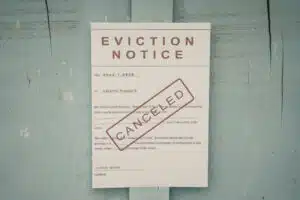
Can You Pay Rent After an Eviction Notice in Chicago Park, CA? Analyzing the Legal Realities and Tenant Options
Receiving an eviction notice is a distressing experience for any tenant. The implications of such a notice are far-reaching, not only due to the immediate threat of losing one’s home but also in relation to long-term consequences involving legal records and future housing prospects. For residents of Chicago Park, CA, understanding the intersection of state and local law is vital to discerning tenant rights and possible remedies following receipt of an eviction notice. This analysis aims to elucidate whether tenants can pay rent after an eviction notice has been delivered, what that payment may legally achieve, and what avenues remain for those seeking to continue renting with an eviction on record.
Introduction to Eviction Notices and Rent Payment Rights
Evictions are governed by a series of statutes and judicial procedures designed to balance the interests of property owners and tenants. Central to these procedures is the eviction notice, a formal declaration issued by a landlord signifying a violation of lease terms, commonly nonpayment of rent. The question of whether a tenant, upon receiving such notice in Chicago Park, CA, retains the right to cure the default by paying the overdue rent demands careful scrutiny of both California state law and any potentially applicable local ordinances. This post provides tenants with a precise understanding of their options, the historical context for eviction proceedings, and practical steps within the legal framework.
The Legal Mechanics of Eviction in California and Nevada County
Historical Evolution of Eviction Law in California
The tradition of notice and opportunity to cure defaults in tenancies traces back to English common law, subsequently adopted and adapted by American states including California. The rationale has always been to afford tenants a final opportunity to remedy lease breaches, thereby averting the socially disruptive effects of eviction when possible. Over time, statutory refinements in California have introduced precise requirements for notices, cure periods, and procedural fairness.
3-Day Notice to Pay Rent or Quit
A landlord’s first step in most nonpayment cases is serving the tenant with a “3-Day Notice to Pay Rent or Quit.” This notice serves three discrete legal functions:
- Notification that the tenant is in default.
- Opportunity for the tenant to ‘cure’ the default within three days by paying the full rental arrears.
- Warning that failure to cure enables the landlord to commence eviction proceedings in court.
Key Legal Concepts
- Cure Period: The three-day window is non-negotiable and statutorily mandated (California Code of Civil Procedure § 1161(2)). Partial payments do not satisfy the notice; full payment is required.
- Service Requirements: Notices must be served personally, by substitute service, or by posting and mailing, ensuring tenants are properly informed.
What Happens After the 3-Day Period?
Should a tenant fail to remit payment within the three-day period, the landlord may file an Unlawful Detainer action in court. This process can be relatively swift and, upon a favorable judgment, grants the landlord possession rights and allows for physical removal of the tenant by law enforcement. There however can be exceptions under CCP § 1179 if the tenant can prove hardship.
Can I Pay Rent After Receiving an Eviction Notice in Chicago Park, CA?
During the 3-Day Period
Yes, unequivocally, tenants retain the right to pay the full amount of unpaid rent within the three-day period specified by the notice. Payment within this window compels the landlord to cease eviction proceedings for nonpayment of rent. This statutory right is recognized uniformly throughout California, including Chicago Park.
Practical Guidance for Tenants
- Ensure the full amount, as specified in the notice, is tendered within the three-day period.
- Obtain written confirmation of payment (receipt, electronic confirmation, etc.).
- Do not rely on partial payments or attempts to negotiate terms after the deadline without written landlord consent.
After the 3-Day Period but Before Unlawful Detainer Filing
If the cure period lapses, yet the landlord has not yet initiated an Unlawful Detainer action, payment of the overdue rent may or may not be accepted at the landlord’s discretion. Legally, the landlord is under no obligation to accept late payment after the statutory period.
- Some landlords may be amenable to accepting payment and dismissing the eviction threat. However, this is entirely voluntary and must be documented in writing. If rent is accepted, that can be considered a legal tenant defense.
- Oral agreements do not override the legal right to proceed with eviction unless formally memorialized.
After the Unlawful Detainer Has Been Filed
Once court action commences, tenants lose the absolute right to ‘cure and remain’ by simply paying the rent (unless specific local ordinances or COVID-era emergency protections intervene). The process from this point forward becomes adversarial, with summary judgment favoring the landlord if nonpayment persists.
- Judicial Discretion: Judges occasionally facilitate settlements or ‘stipulations for judgment’ allowing tenants to remain in exchange for full payment, but this is not guaranteed and relies on mutual consent.
- Legal Fees and Costs: If permitted, the landlord may also seek legal fees, court costs, and potentially restitution for use and occupancy if judgment is entered.
Local Protections and Exceptions
Chicago Park falls under the jurisdiction of Nevada County. While some California municipalities have enacted “just cause” or “right to cure” ordinances affording tenants broader rights even after the statutory period, as of the most recent legislative session, Nevada County has not adopted such measures. Thus, general state law prevails.
- Pandemic-Related Protections: Temporary statewide rules instituted during COVID-19 expanded pay-to-stay options and extended notice periods, but these have largely expired.
Consequences of Eviction for Future Renting
Renting With an Eviction Record
A completed eviction, or Unlawful Detainer judgment, creates a permanent public record. This record is accessible to landlords and tenant screening agencies, often impairing future rental prospects. The impact can extend for seven years or longer, hampering mobility and housing stability. An eviction record can remain on your tenant report for up to seven years.
Renting After Eviction
- Disclose proactively when applying for new tenancies. Some landlords are open to explanations of mitigating circumstances, especially if the underlying issue (such as job loss) has been resolved.
- Seek references from former landlords unconnected to the eviction.
- Consider second-chance rental agencies or properties with less stringent screening criteria.
- Expungement: California law allows for record sealing if the case is dismissed or judgment is vacated, but eviction judgments typically cannot be expunged purely based on hardship.
Practical Steps for Tenants Facing Eviction
Immediate Actions
- Consult Legal Aid: Prompt engagement of tenant advocates or legal aid is critical, especially for tenants unaware of their precise legal rights or for those who believe the notice may be defective.
- Communicate Quickly: If you can pay but require a short extension, communicate clearly with your landlord and seek written agreements.
- Document All Communications: Keep comprehensive records of all negotiations, payments, and correspondence.
- Attend All Court Dates: Failure to respond to court filings may result in a default judgment and rapid lockout.
Preventative Strategies
- Budget for rent payment as a nonnegotiable priority.
- Request rent payment plans before becoming delinquent.
- Engage in mediation programs if available locally.
The Role of Local Property Management and Tenant Support
Rocklin Property Management, as a Rocklin-based firm knowledgeable in regional landlord-tenant relations, provides not only property management but also tenant support. Their services include:
- Guidance regarding notices and cure periods
- Assistance with documentation for payment or court defense
- Information on negotiating with landlords
- Referral to reputable legal resources in Nevada County
For tenants uncertain about specific local practices, contacting a property manager familiar with state and county ordinances is a prudent first step.
Navigating Evictions and Rent Payment in Chicago Park, CA
Receiving an eviction notice in Chicago Park, CA, does not automatically foreclose the possibility of retaining your tenancy. Under California law, payment in full during the notice cure period compels the landlord to withdraw the eviction for nonpayment. However, once the statutory period ends, options narrow considerably, underscoring the necessity of prompt and informed action.
For tenants relocating after an eviction, transparency and preparedness increase the chances of securing quality housing in the future. Engaging professional support, such as that offered by Rocklin Property Management, can further safeguard tenant rights and support informed decision-making during periods of housing instability.
Tenancy in California demands acute awareness of one’s rights and responsibilities. By acting swiftly, communicating transparently, and seeking expert guidance, tenants can significantly improve outcomes even in difficult circumstances involving evictions and renting after eviction.



